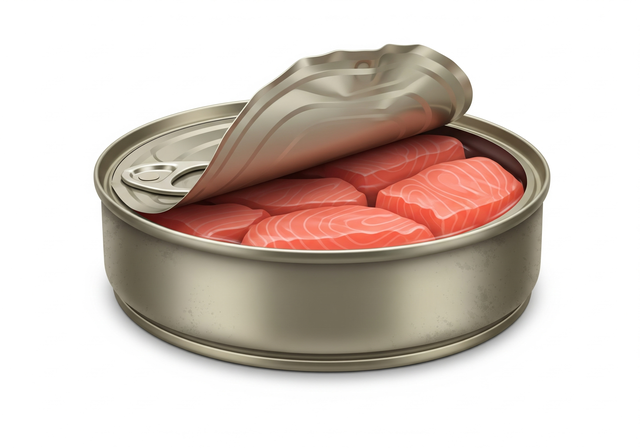Are canned fish bones safe?
Canned fish often undergoes a packaging process at high temperature and pressure, which helps soften the bones for easy chewing and digestion, according to Health (USA).
“This process breaks down the calcium structure, making bones soft and safe to consume,” said nutritionist Rima Kleiner, in the US.
Because of their soft texture, bones in canned fish are usually safe, but there are some exceptions.

Canned fish can be added to daily meals to increase nutrients.
PHOTO: AI
“I do not recommend eating fish bones in canned fish products for people who have problems swallowing after radiation therapy, uncontrolled gastroesophageal reflux (GERD), or children under 3 years old. Therefore, I often advise people to mash canned sardines or salmon with lemon juice to soften the bones as much as possible before eating,” says nutritionist Louisa Mason, in the US.
When canning fish, manufacturers sterilize it with autoclaves, heating the fish under pressure to over 115 degrees Celsius. The bones become spongy and soft, similar to marrow when stewed. Cooking it this way also improves the texture and increases the absorption of nutrients.
“This not only kills pathogens, but also softens the collagen and minerals in the bones,” says Mason.
Nutritionist Kleiner adds that for sardines and anchovies - fish with thin, fine bones - during the canning process, the bones almost disintegrate, making them safe to eat.
As for salmon – a larger fish with more visible bones – the bones soften considerably during pressure canning, but retain more structure than the bones of sardines or anchovies. These soft bones are perfectly edible, but should be eaten with caution.

In general, canned fish bones are edible, but care should be taken when eating them.
Illustration: AI
Unexpected health benefits
Canned fish is one of the most absorbable sources of calcium in the diet. The bones in the can also contain boron, a trace mineral important for estrogen metabolism and bone health, says Mason.
Yet it’s one of the most overlooked nutrient-rich foods, especially for active people or the elderly. Mason recommends eating canned fish two to four times a week, alternating between sardines, salmon, and anchovies to diversify your micronutrient intake and minimize your exposure to heavy metals.
Researchers have found that people who eat canned fish may actually live longer than those who don’t. In another study, eating canned sardines was even more effective at promoting health and longevity, and getting more omega-3s than taking fish oil supplements.
Preliminary studies also show that eating canned fish may reduce the risk of certain types of cancer, with benefits similar to those of eating fresh fish.
However, according to expert Mason, people should avoid eating canned fish bones in the following cases:
- Fish bones are not easily deformed when impacted with a fork.
- Have chronic kidney disease, because phosphorus absorption may be increased.
- Difficulty swallowing (dysphagia) and gastrointestinal problems.
- Pregnant.
Source: https://thanhnien.vn/co-nen-an-xuong-ca-trong-ca-dong-hop-185250702194841219.htm



![[Photo] General Secretary To Lam attends the opening ceremony of the National Achievements Exhibition](https://vphoto.vietnam.vn/thumb/1200x675/vietnam/resource/IMAGE/2025/8/28/d371751d37634474bb3d91c6f701be7f)
![[Photo] Red flag with yellow star flutters in France on National Day September 2](https://vphoto.vietnam.vn/thumb/1200x675/vietnam/resource/IMAGE/2025/8/28/f6fc12215220488bb859230b86b9cc12)
![[Photo] General Secretary To Lam presents the 45-year Party membership badge to comrade Phan Dinh Trac](https://vphoto.vietnam.vn/thumb/1200x675/vietnam/resource/IMAGE/2025/8/28/e2f08c400e504e38ac694bc6142ac331)
![[Photo] Politburo works with the Standing Committee of Cao Bang Provincial Party Committee and Hue City Party Committee](https://vphoto.vietnam.vn/thumb/1200x675/vietnam/resource/IMAGE/2025/8/28/fee8a847b1ff45188749eb0299c512b2)
![[Photo] Prime Minister Pham Minh Chinh meets with Speaker of the New Zealand Parliament Gerry Brownlee](https://vphoto.vietnam.vn/thumb/1200x675/vietnam/resource/IMAGE/2025/8/28/cec2630220ec49efbb04030e664995db)





























































































Comment (0)